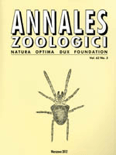
Annual Review of Ecology Evolution and Systematics
metrics 2024
Bridging Theory and Practice in Ecological Sciences
Introduction
The Annual Review of Ecology, Evolution, and Systematics, published by Annual Reviews, is a leading academic journal dedicated to advancing the understanding of ecological and evolutionary processes. With a commendable impact factor and impressive rankings—9th in both the Ecology, Evolution, Behavior and Systematics category and the Environmental Science category—this journal is recognized for its rigorous peer-reviewed articles that synthesize research findings across a wide range of topics within the fields of ecology and evolutionary biology. Established in 2003, this annual publication aims to provide researchers, professionals, and students with comprehensive insights into the latest developments and trends within these dynamic disciplines. By facilitating access to high-quality scholarly articles, the Annual Review of Ecology, Evolution, and Systematics continues to play a crucial role in fostering scientific discourse and discovery.
Metrics 2024
 5.40
5.40 11.20
11.20 16.00
16.00 247
247Metrics History
Rank 2024
Scopus
IF (Web Of Science)
JCI (Web Of Science)
Quartile History
Similar Journals

Journal of Vertebrate Biology
Exploring the depths of biodiversity and conservation.Journal of Vertebrate Biology, a reputable publication established by the Institute of Vertebrate Biology in the Czech Republic, serves as a vital platform for research across the fields of Animal Science and Zoology, Aquatic Science, and Ecology, Evolution, Behavior and Systematics. With its ISSN 2694-7684 and a commendable 2023 Q2 ranking in multiple categories, this open-access journal embraces innovative scientific inquiry and fosters academic discourse. The journal's commitment to disseminating high-quality research is reflected in its Scopus rankings, positioning it within the top quartile in several impactful areas. As it continues to converge its focus until 2024, researchers, professionals, and students alike are encouraged to engage with cutting-edge studies that advance our understanding of vertebrate biology. This publication stands out not only in its scholarly contributions but also in enhancing global awareness of biodiversity and conservation issues.

BIOLOGICAL REVIEWS
Fostering collaboration in the pursuit of biological excellence.BIOLOGICAL REVIEWS is a prestigious academic journal published by Wiley, focusing on the expansive fields of Agricultural and Biological Sciences and Biochemistry, Genetics and Molecular Biology. Established in 1924, the journal has upheld its reputation for over a century, advancing both theoretical and applied research aimed at addressing critical biological challenges. With an impressive 2023 Q1 ranking in both its primary categories and a Scopus ranking that places it among the top journals worldwide—ranked #2 in Agricultural and Biological Sciences and #8 in Biochemistry—BIOLOGICAL REVIEWS is at the forefront of scientific inquiry. Researchers, professionals, and students will find a wealth of knowledge in its comprehensive review articles, providing valuable insights into the latest findings and methodologies in the biological sciences. Although not an Open Access journal, its rigorous peer-review process ensures the dissemination of high-quality, impactful research, contributing to advancements in the field while fostering a collaborative scientific community.

Biology Letters
Exploring the frontiers of biological inquiry with precision.Biology Letters, published by the esteemed Royal Society, stands at the forefront of research in the field of biological sciences, with a strong emphasis on innovative studies that bridge gaps across disciplines. Since its inception in 2005, the journal has garnered significant recognition, achieving a remarkable Q1 ranking in Agricultural and Biological Sciences (miscellaneous) and a percentile of 88th in the same category, according to Scopus rankings. Released in the United Kingdom, the journal offers a platform for authors to share concise research findings and theoretical perspectives that contribute meaningfully to the advancement of biological inquiry. Although not open access, the journal remains highly regarded in the academic community for its rigorous peer-review process and impactful content, making it an invaluable resource for researchers, professionals, and students dedicated to exploring the complexities of biology. With an ongoing commitment to excellence, Biology Letters continues to shape the future of biological sciences.

BMC Ecology and Evolution
Championing innovative research in a changing world.BMC Ecology and Evolution is a premier open access journal published by BMC, dedicated to advancing our understanding of ecological and evolutionary processes in a rapidly changing world. With a growing e-ISSN of 2730-7182, this journal serves as a vital platform for researchers and scholars looking to disseminate high-quality research findings that explore the interplay between ecological dynamics and evolutionary developments. Operating from London, England, BMC Ecology and Evolution provides seamless access to valuable research, ensuring that significant studies are available to a global audience without barriers. The journal fosters a collaborative atmosphere, welcoming diverse research methodologies and interdisciplinary approaches, thus making it a crucial resource for professionals, students, and academics alike. Its commitment to open access ensures that pioneering research in ecology and evolution is readily available, encouraging the continuous exchange of ideas and knowledge in the field.

AMERICAN NATURALIST
Advancing Knowledge in Natural SciencesAMERICAN NATURALIST, published by University of Chicago Press, stands as a premier outlet for scholarly research in the fields of ecology, evolution, behavior, and systematics. With an impact factor that reflects its high citation rate, the journal has garnered a reputation within the academic community, evidenced by its placement in the Q1 category of its discipline in 2023 and an impressive Scopus rank of #135 out of 721 journals, positioning it in the 81st percentile for Agricultural and Biological Sciences. The journal, established in 1946, continues to uphold its commitment to advancing scientific knowledge through rigorous peer-reviewed articles. Researchers and professionals will find AMERICAN NATURALIST an essential resource, providing insights and discussions that illuminate complex biological phenomena, while fostering a deeper understanding of the natural world. As an essential reading for students and seasoned experts alike, its curated body of work encourages innovative thinking and exploration across an array of ecological and evolutionary topics.

EVOLUTIONARY ECOLOGY
Advancing Knowledge at the Intersection of Evolution and EcologyEVOLUTIONARY ECOLOGY is a prestigious academic journal published by SPRINGER, exploring the intricate relationships between evolutionary processes and ecological dynamics since its inception in 1987. As a key resource in the field of Ecology, Evolution, Behavior, and Systematics, the journal is recognized for its impactful contributions, holding a commendable Q2 quartile ranking in its category as of 2023. With an emphasis on empirical and theoretical studies that bridge evolutionary biology with ecological principles, EVOLUTIONARY ECOLOGY is essential for researchers, practitioners, and students aiming to deepen their understanding of biodiversity, adaptation, and ecosystem functioning. Although it currently does not offer open access, the journal maintains a commitment to disseminating high-quality research that influences both foundational knowledge and practical applications in the field. Located in the Netherlands, the journal continues to serve a global audience, making significant contributions to advancing ecological and evolutionary research through rigorous scientific discourse and innovation.

Nature Ecology & Evolution
Pioneering impactful studies in ecology and evolution.Nature Ecology & Evolution is a premier journal that serves as a cornerstone for cutting-edge research in the dynamic fields of ecology, evolution, behavior, and systematics. Published by NATURE PORTFOLIO, this journal, with the ISSN 2397-334X, emphasizes high-quality, impactful studies that advance our understanding of ecological interactions and evolutionary processes. With an impressive Scopus ranking placing it in the 99th percentile—#6 out of 721 in Ecology, Evolution, Behavior and Systematics and #5 out of 461 in Environmental Science Ecology—it is classified as a Q1 journal, highlighting its significance in the research community. Established in 2016, it continues to foster an open dialogue among researchers and practitioners while facilitating the dissemination of transformative ideas that shape environmental policy and conservation strategies. While access to articles is restricted, the journal's robust impact factor underscores its relevance in scholarly discourse. Researchers, professionals, and students are encouraged to engage with the current trends and discoveries published in this leading journal, which thrives on addressing the challenges and complexities of our natural world.

Frontiers in Ecology and Evolution
Unveiling the complexities of life through ecology and evolution.Frontiers in Ecology and Evolution, published by FRONTIERS MEDIA SA, stands as a premier open-access journal dedicated to the exploration and discourse in the interdisciplinary fields of ecology and evolutionary biology. With its inception in 2013, this journal has rapidly ascended to a prestigious position, securing a Q1 ranking in both Ecology and Ecology, Evolution, Behavior and Systematics categories, reflecting its influential impact in the respective fields. Operative from Switzerland, Frontiers in Ecology and Evolution enables researchers, professionals, and students to access high-quality research without barriers, promoting collaboration and innovation. The journal covers a broad range of topics, from ecological dynamics to evolutionary strategies, facilitating profound insights that drive scientific advancement and understanding. With a remarkable position in Scopus rankings—ranking #218 in Ecology, Evolution, Behavior and Systematics and #145 in Environmental Science—this journal is essential for anyone keen on contributing to or staying updated with contemporary research in ecology and evolution.

ORGANISMS DIVERSITY & EVOLUTION
Advancing Knowledge: The Intersection of Ecology and EvolutionOrganisms Diversity & Evolution is a premier academic journal published by Springer Heidelberg, dedicated to advancing the fields of ecology, evolution, behavior, and systematics. Established in 2001 and continuing through 2024, this journal plays a crucial role in disseminating high-quality research that explores the complexities of biological diversity and evolutionary processes. With a commendable 2023 Scopus ranking of #253/721 in its category, placing it in the 64th percentile, and categorized in the Q2 quartile for Ecology and Evolution, it consistently attracts contributions from leading scientists and researchers worldwide. Although it operates on a subscription basis, the journal's rigorous peer-review process and dedication to impactful scientific discourse make it an invaluable resource for academics, practitioners, and students keen on understanding the intricate relationships that shape our biodiversity. By highlighting innovative research and fostering discussions on urgent ecological challenges, Organisms Diversity & Evolution serves as a vital platform for those committed to conservation and evolutionary biology.

ANNALES ZOOLOGICI
Charting New Territories in Zoological StudiesANNALES ZOOLOGICI is a distinguished academic journal published by the Museum & Institute of Zoology, Polish Academy of Sciences, based in Warsaw, Poland. With a long-standing tradition in zoological research, this journal has evolved to encompass a diverse range of studies in ecology, evolution, behavior, and systematics, aiming to foster a deeper understanding of animal biology and conservation. It holds a commendable Q2 classification in the 2023 Ecology, Evolution, Behavior and Systematics category, indicating its significant contribution to the field. Although ANNALES ZOOLOGICI is not an open-access publication, it remains accessible to a global audience of researchers, professionals, and students aiming to advance their knowledge and engage with cutting-edge zoological findings. As of 2024, this journal continues to be a vital resource for those eager to explore the complexities of animal life and contribute to ongoing discussions within this essential scientific discipline.